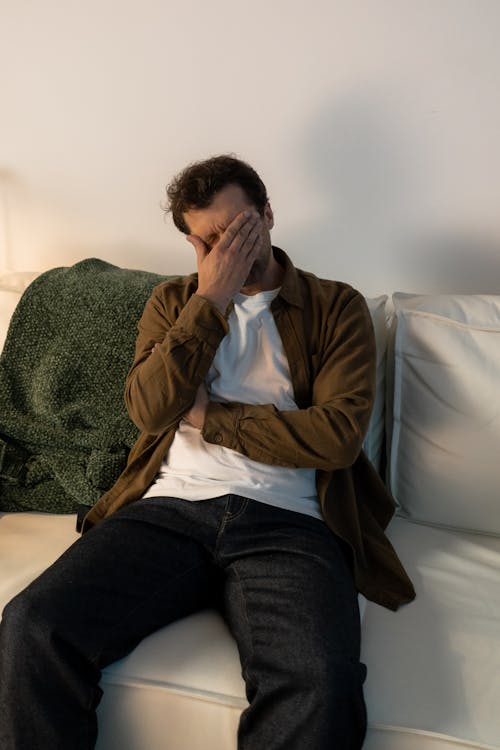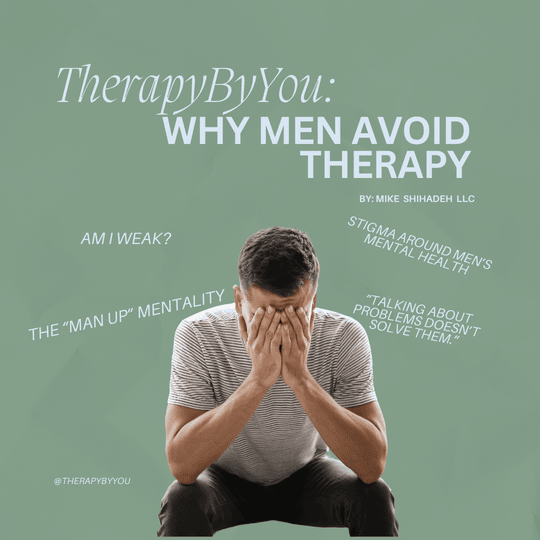Why Men Avoid Therapy

The Stigma Around Men’s Mental Health
Mental health stigma remains one of the most significant barriers preventing men from seeking therapy. From a young age, boys are conditioned to believe that expressing emotions is a sign of weakness. Phrases like “be a man” or “boys don’t cry” reinforce the idea that vulnerability is something to be ashamed of.
As a result, many men suppress emotions, internalizing stress and anxiety rather than seeking help. This conditioning creates a culture where men feel pressure to maintain emotional control, even when struggling. Over time, this avoidance can contribute to worsening mental health conditions, strained relationships, and even physical health problems. Ignoring mental health is not a solution — it’s a risk.
The Statistics: A Cause for Concern
- 79% of suicides involve men, with male suicide rates nearly four times higher than those of women (National Institute of Mental Health, 2023).
- Less than half of men with depression or anxiety seek professional help (Harvard Gazette, 2023).
- Many men turn to substance abuse or destructive coping mechanisms instead of therapy (Mental Health Stigma Study, 2020).
- Men are more likely than women to engage in risky behaviors, including excessive drinking, reckless driving, and workaholism, as a means of coping with stress.
Feeling the pressure to “tough it out”? You don’t have to face it alone.
Schedule a Free ConsultationWhy Men Avoid Therapy
1. The “Man Up” Mentality
“I should handle my problems on my own. Asking for help means I’m not strong enough.”
Reality: Self-reliance is a valued trait, but it doesn’t mean you must struggle alone. Even the toughest, most capable individuals sometimes need expert guidance – and recognizing when you need help is actually a form of wisdom and strength.
Think of it this way: if you had a persistent cough that wasn’t getting better, would you avoid the doctor out of pride? Probably not, because you want to fix the issue properly. Mental health is no different. In fact, untreated mental issues often worsen or lead to other problems.
Men who avoid addressing depression or anxiety may end up experiencing declining work performance, relationship breakdowns, or turning to unhealthy coping mechanisms. Statistics show that men are far more likely than women to cope through substance abuse – for example, men have significantly higher rates of alcohol-related deaths and drug overdoses (Males and Mental Health Stigma, 2020). That’s not because men are “worse” at handling problems; it’s because societal pressure kept them from healthier outlets like therapy. By contrast, getting professional help early can prevent a downward spiral.
A therapist can equip you with tools to manage your stress and emotions, so you actually become more resilient and in control. Far from undermining your self-reliance, therapy enhances your ability to handle life – you’re investing in yourself, ensuring that you’ll be there at full strength for your loved ones and responsibilities.
2. Fear of Judgment
“Therapy is for women (or ‘weak’ men’); I’ll be judged or laughed at if I go.”
A common misconception is that therapy is “not for real men.” Some worry about how others — friends, family, colleagues — might perceive them if they admit they need support. This fear of appearing weak keeps many men from even considering therapy, reinforcing cycles of stress and emotional distress.
Public attitudes are changing: more people now admire someone who takes care of his mental health than someone who stubbornly ignores a problem. If a friend truly judges you for improving yourself, that says more about their misunderstanding than about you. Moreover, confidentiality means no one has to know you’re in therapy unless you choose to tell them. Many men attend therapy quietly, and others openly talk about it – both are fine. What’s important is to not let fear of judgment stop you from getting better. Consider that nearly every man will face a mental or emotional challenge at some point – be it stress, grief, or a personal crisis – and needing help is nothing to be ashamed of.
Even within traditionally “macho” circles, the narrative is shifting. Campaigns like the NFL’s “#MyCauseMyCleats” or the military’s mental fitness initiatives encourage men to treat mental health as part of overall health, not a weakness. Many famous male athletes, actors, and leaders have openly credited therapy for helping them overcome hurdles. Their message: getting help is a form of self-improvement, not a weakness.
Over time, the stigma keeps fading. In a panel on masculinity and mental health, one speaker noted that men often just need “permission to be vulnerable” – and once they have it, they eagerly embrace that freedom (Harvard Gazette, 2023). Give yourself that permission; you might be surprised how much respect (including self-respect) you earn in the process.

3. “Talking about problems doesn’t solve them.”
Many men assume therapy is about venting emotions without practical solutions. In reality, modern therapy offers evidence-based strategies for problem-solving, stress management, and emotional regulation. Therapists help clients develop coping mechanisms that can be applied to work, relationships, and everyday challenges. And you don’t have to be a super emotional or “touchy-feely” person to benefit from it.
Therapists are trained to meet clients where they are. If you’re uncomfortable with emotional language, a good therapist will not force you to spill your deepest feelings on day one. Progress can be gradual and based on your comfort level. That said, you might be surprised by how relieving it actually is to articulate some of what’s been bottled up. Many men discover that once they start talking in a private, judgment-free setting, it does help lighten the load.
There’s also solid evidence that talking helps: one study found that contrary to the stereotype, a majority of men prefer therapy that allows them to explore vulnerable emotions and personal experiences (along with learning coping strategies) (Challenging Assumptions About What Men Want, 2021). Men in that study who gave therapy a chance wanted to delve into feelings when they realized it was making them feel better. Furthermore, conversation in therapy often leads to actionable insights – for example, recognizing “I get anxious because I fear failure like when I was a kid” might lead to doing exercises in session to build confidence.
It’s absolutely fine if you’re not used to discussing feelings; therapists understand that and will guide the process. Think of it like exercising a new muscle – it might feel awkward initially, but over time you build emotional strength. And you don’t have to turn into an open book with everyone; therapy simply gives you a safe outlet to process things so that you can feel and function better in everyday life.
4. Lack of Representation
“What if the therapist doesn’t understand me or my problems as a man?”
Some men feel that therapy is not designed for them. With many therapists being women, some men worry about whether they will be understood. Fortunately, more male therapists (myself included) and therapy spaces tailored to men are emerging. Additionally, therapy is becoming more adaptable, with specialized programs addressing concerns specific to men’s emotional and psychological needs.
In recent years especially, mental health professionals have put a spotlight on improving care for men. The APA’s Guidelines for Psychological Practice with Boys and Men (2018) explicitly addresses how traditional masculinity norms can affect mental health and urges therapists to be mindful of things like men’s comfort with emotional expression, potential stigma, and the importance of respecting each man’s identity.
Don’t hesitate to “interview” a therapist in an initial session about their approach. You can ask, “Have you worked with a lot of male clients?” or “How do you handle it if a client isn’t used to talking about feelings?” Their answers will likely reassure you. Also, therapy is a collaborative relationship – if something isn’t clicking, you can bring it up. A good therapist will welcome your feedback (for example, if you feel they don’t quite grasp something about your perspective, you can clarify it). Most men find that once they establish a rapport, their therapist does understand them quite well, sometimes better than they expected. Additionally, there are practices geared specifically toward men.
Here at Therapy By You, for instance, we take pride in creating “a safe, no-BS space for men to talk openly” – we recognize that men often want a comfortable, straightforward environment and we strive to provide that.
Taking the First Step
If you or someone you know is struggling, the first step is the hardest but most crucial. Whether it’s reaching out to a professional, exploring online therapy options, or even talking to a trusted friend, acknowledging the need for support is a victory in itself.
If the idea of traditional therapy feels intimidating, consider starting with a low-pressure option, such as an anonymous mental health support line, an online forum, or a self-help book recommended by a mental health professional. Taking small steps toward self-awareness and emotional well-being is more valuable than avoiding the conversation altogether.
Conclusion
Men’s mental health matters. The stigma around seeking therapy is slowly fading, but there’s still work to do. Every conversation, every shared story, and every man who steps into therapy contributes to breaking down these barriers. Therapy is not just about dealing with problems — it’s about building a stronger, healthier, and more resilient life.
Are you ready to challenge the narrative and take control of your mental well-being?
Frequently Asked Questions
Does seeking therapy mean I’m weak?
Not at all. Needing help is a sign of being human, not weakness. In fact, recognizing you need support and taking action is a sign of strength and wisdom. Therapy is about improving yourself – even the strongest people seek guidance to become better.
Will people judge me for going to therapy?
Attitudes are changing, and most people now respect those who take care of their mental health. True friends and family won’t judge you for trying to get better. Plus, therapy is confidential – no one will know you’re attending unless you choose to tell them.
What if I’m not comfortable talking about feelings?
Therapists are trained to work with your comfort level. A good therapist won’t force you to open up all at once. You can start at your own pace. Many men find that as trust builds, talking becomes easier and actually relieving. You only share what you’re ready to, when you’re ready.
How can I find a therapist who understands men’s issues?
Look for therapists who specialize in men’s mental health or consider a male therapist if that makes you more comfortable. You can also ask potential therapists about their experience working with male clients. Therapy is a collaboration – a good therapist will make the effort to understand your perspective.
What if I’m not ready to commit to therapy?
It’s okay to start small. You might try talking to a close friend, joining a support group, or calling a free mental health hotline for anonymous help. You can also read self-help resources recommended by professionals. Even small steps – like learning coping skills or journaling – can make a difference until you feel ready for therapy.
Ready to Take Control of Your Mental Well-Being?
Break the silence and start your journey toward a stronger, healthier life today.
Schedule Your Free ConsultationReferences
- American Psychological Association. (2018). APA guidelines for psychological practice with boys and men.
- Challenging Assumptions About What Men Want. (2021). Examining preferences for psychotherapy among men attending outpatient mental health clinics.
- Harvard Gazette. (2023). Stigma and mental health care for men.
- Mental Health Stigma Study. (2020). Understanding barriers to mental health treatment among men.
- Males and Mental Health Stigma. (2020). Substance abuse and coping mechanisms in men.
- National Institute of Mental Health. (2023). Mental health statistics and research.

